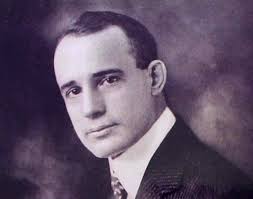The Enduring Influence of Napoleon Hill: From Bob Proctor to Modern Self-Help
7/12/20244 min read


The Life and Legacy of Napoleon Hill
Napoleon Hill, born on October 26, 1883, in a modest cabin in Wise County, Virginia, is often regarded as one of the forefathers of personal development and self-help literature. His early years were marked by hardship, but his inquisitive nature and determination set the stage for a remarkable career. Educated in law, Hill's true calling came through journalism, where he was tasked with interviewing successful individuals, a role that would eventually shape his life's work.
Hill's career took a significant turn when he met Andrew Carnegie, the steel magnate, who challenged him to interview successful people in order to distill a philosophy of success. This project spanned two decades and culminated in Hill's most famous work, Think and Grow Rich, published in 1937. The book, which has sold over 100 million copies worldwide, laid the foundation for the modern self-help movement. It elaborates on principles such as the power of thought, the importance of a definite goal, and the value of persistence.
Throughout his career, Hill interviewed over 500 successful individuals including Thomas Edison, Henry Ford, and Alexander Graham Bell. These interviews provided the empirical basis for his success principles, which emphasized attributes like desire, faith, and organized planning. Hill's methodologies were revolutionary for their time and continue to resonate with readers today, establishing a legacy that extends well beyond his era.
Hill's influence is evident in the works of countless self-help leaders who followed in his footsteps. His principles have been adapted, expanded upon, and propagated by modern figures such as Bob Proctor, who has openly credited Hill's teachings as a significant influence on his own philosophy. Hill's pioneering efforts in identifying and articulating the mechanisms of personal success have left an indelible mark on the self-help industry, making his work timeless and universally relevant.
Bob Proctor: A Testament to Hill's Teachings
Bob Proctor's journey in the self-help industry is a powerful testament to the enduring influence of Napoleon Hill's teachings. Proctor, a renowned figure in the field of personal development, attributed much of his success to the principles he discovered in Hill's seminal work, Think and Grow Rich. For over 50 years, Proctor has studied and applied Hill's teachings, which have profoundly impacted both his personal and professional life.
Born in Ontario, Canada on July 5, 1934, Bob Proctor's early life was fraught with challenges, including a lack of formal education and a series of unfulfilling jobs. However, his life took a pivotal turn when he encountered Napoleon Hill's book. The concepts of positive thinking, goal setting, and the power of the subconscious mind resonated deeply with him. Proctor's dedication to understanding and implementing these principles marked the beginning of his transformation.
One of the core principles Proctor adopted from Hill is the significance of a positive mental attitude. According to Proctor, cultivating a mindset focused on positivity and abundance creates a fertile ground for personal growth and success. This belief in the transformative power of thoughts became a cornerstone of Proctor's teachings and seminars, inspiring countless individuals to reframe their perspectives and pursue their dreams.
Goal setting, another fundamental principle from Hill's work, played a crucial role in Proctor's achievements. He emphasized the necessity of having clear, well-defined goals, accompanied by a burning desire to achieve them. By continuously visualizing and affirming his objectives, Proctor demonstrated how unwavering focus and determination could turn aspirations into reality.
Furthermore, Proctor explored the power of the subconscious mind, a key concept in Hill's philosophy. He advocated for the idea that the subconscious mind, when harnessed effectively, could serve as a powerful tool for manifesting one's desires. This belief led Proctor to develop techniques and exercises aimed at reprogramming the subconscious, enabling individuals to overcome limiting beliefs and unlock their full potential.
Over the decades, Bob Proctor became a leading figure in the self-help industry, perpetuating Napoleon Hill's legacy through his books, seminars, and coaching programs. His influence helped millions of people worldwide to embrace a mindset of success and achieve their goals. Proctor's journey stands as a testament to the enduring power of Hill's teachings and the profound impact they can have on an individual's life. He transitioned into Spirit on February 3, 2022.
Reformatting the Subconscious Mind for Success
The power of affirmations lies in their ability to reformat the subconscious mind, a concept deeply rooted in neuroscience and psychology. Affirmations are positive statements that, when repeated consistently, can influence the subconscious mind to foster a mindset conducive to success. The science behind affirmations is grounded in the principle of neuroplasticity, the brain's ability to reorganize itself by forming new neural connections. When we consistently affirm positive thoughts, we essentially rewire our brains, creating pathways that support our goals and aspirations.
Affirmations work by embedding positive statements into the subconscious, which in turn shapes our behavior and attitudes. The subconscious mind does not differentiate between reality and imagination; it accepts the repeated affirmations as truth. Therefore, the more we affirm positive thoughts, the more likely we are to internalize these beliefs, ultimately influencing our actions in a positive direction. The key to effective affirmations is consistency and repetition. Just as habits are formed through repeated actions, affirmations need to be practiced regularly to yield results.
Creating effective affirmations involves several steps. First, they should be stated in the present tense, as if the desired outcome is already happening. This helps the subconscious mind to accept them as reality. Second, affirmations should be positive and specific, focusing on what you want to achieve rather than what you want to avoid. Lastly, they should be emotionally charged, as the subconscious mind responds more strongly to thoughts and statements that carry emotional weight.
Integrating affirmations into daily routines can be achieved through various methods. Some people find it beneficial to repeat affirmations during meditation or while engaging in activities that require minimal conscious thought, such as walking or exercising. Writing affirmations in a journal and placing visual reminders around your living space can also reinforce their impact.
For those seeking a structured approach to reformatting their subconscious mind, the book Heart-Commands of a Love-Driven Millionaire Mind offers a comprehensive five-year program designed for personal transformation. This resource distills the principles of effective affirmations and provides a roadmap for achieving enduring success through the power of positive thinking.
The Health Wealth Love Travel Team
(Affiliate links are within this article. Should you click and purchase, we will receive a commission at no extra cost to you)
Health Wealth Love Travel
Uncover your health, manifest wealth, create connections, and explore the world
© 2024. All rights reserved.
